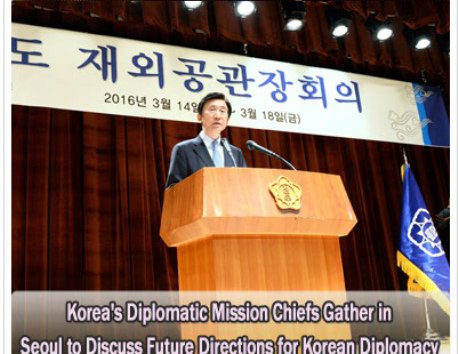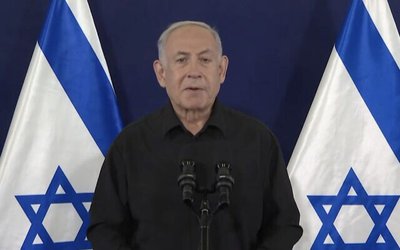
Chiefs of the Republic of Korea’s Overseas Diplomatic Missions Discuss ways to Implement Diplomacy for Addressing the North Korean Nuclear Issue and for a Peaceful Unification of the Korean Peninsula.
The meeting was commenced on March 14. The mission chiefs listened to a lecture by Senior Secretary to the President for Foreign Affairs and National Security Kim Kyou-hyun under the theme “diplomacy for addressing the North Korean nuclear issue and for a peaceful unification of the Korean Peninsula on first day. They also held intensive group discussions on various diplomatic efforts on which the ROK government is focusing in order to create an environment where North Korea has no choice but to change.
In group discussions, the mission chiefs engaged in in-depth discussions based on their experiences at the forefront of diplomacy under the four topics: “comprehensive approach to North Korea and its nuclear issues,” “solidifying peace on the Korean Peninsula through proactive diplomacy in Northeast Asia,” “multi-directional regional diplomacy for a peaceful unification of the Korean Peninsula,” and “strengthening global infrastructure to support unification.”
Senior Secretary to the President for Foreign Affairs and National Security Kim Kyou-hyun explained the ROK government’s policies and priorities to induce North Korea to abandon its nuclear program and take the path toward genuine change. He also talked about what overseas diplomatic missions need to do regarding the government’s policies and priorities.
In the group discussions, the mission chiefs shared their vivid experiences in diplomacy, and held robust discussions on diplomatic activities they need to carry out in order to induce North Korea to give up its nuclear program and change its behavior.
In the group discussion on “comprehensive approach to North Korea and its nuclear issues,” the mission chiefs agreed on the need for strategies to pressure North Korea that are tailored to the conditions of each host country. They also said that they will work to ensure that their host countries actively participate in the faithful implementation of Security Council resolutions, including by supporting efforts to strengthen capacities to implement Security Council resolutions.
In the group discussion on “solidifying peace on the Korean Peninsula through proactive diplomacy in Northeast Asia,” the mission chiefs agreed on the need to strengthen diplomacy towards four neighboring countries, namely the US, China, Japan and Russia, to address the North Korean nuclear issue and maintain peace and stability on the Korean Peninsula. They also agreed on the need to facilitate various mini- and multi-lateral cooperation among the ROK, the US, and Japan, among the ROK, China and Japan, and among the ROK, the US and China.
In particular, they agreed on the importance of the Northeast Asia Peace and Cooperation Initiative as a process of multilateral cooperation to lay a foundation for sustainable peace and prosperity in Northeast Asia. They also agreed on the roadmap which aims to expand and strengthen inter-governmental consultations by enhancing cooperation in various areas, including nuclear safety, disaster management, and energy security, based on broad international support for the Initiative.
In the group discussion on “multi-directional regional diplomacy for a peaceful unification of the Korean Peninsula,” the mission chiefs agreed to actively pursue the Eurasia Initiative, a mid- to long-term policy to achieve sustainable prosperity and peace by improving connectivity and increasing exchanges and cooperation between Asia and Europe, in order to help countries in the region facilitate change in North Korea and understand the need for unification on the Korean Peninsula, and thereby to create favorable conditions for peaceful unification.
In the group discussion on “strengthening global infrastructure to support unification,” the mission chiefs shared the view that the North Korean human rights issue, along with denuclearization, is a key agenda for the ROK’s North Korea policy, which should be addressed in the process of working towards unification. They discussed concrete ways to cooperate with the international community on the issue.
They also agreed to further strengthen diplomatic efforts to prepare for unification in a steady manner, including expanding international support for the ROK’s policy for peaceful unification, and sharing Germany’s unification experience and Eastern European countries’ transition experience.
Drawing upon the outcome of the discussions at the 2016 meeting of the mission chiefs, the Foreign Ministry will make active efforts to induce North Korea to abandon its nuclear program and become a responsible member of the international community.
- TANAHU HYDROPOWER PROEJCT: A Significant Achievement
- Apr 15, 2024
- AMBASSADOR HANAN GODAR: Sharing Pain With A Nepali Family
- Mar 30, 2024
- VISIT OF KfW AND EIB TO NEPAL : Mission Matters
- Mar 25, 2024
- NEPAL BRITAIN SOCIETY: Pratima Pande's Leadership
- Mar 24, 2024
- NEPAL ARMY DAY: Time To Recall Glory
- Mar 15, 2024
















